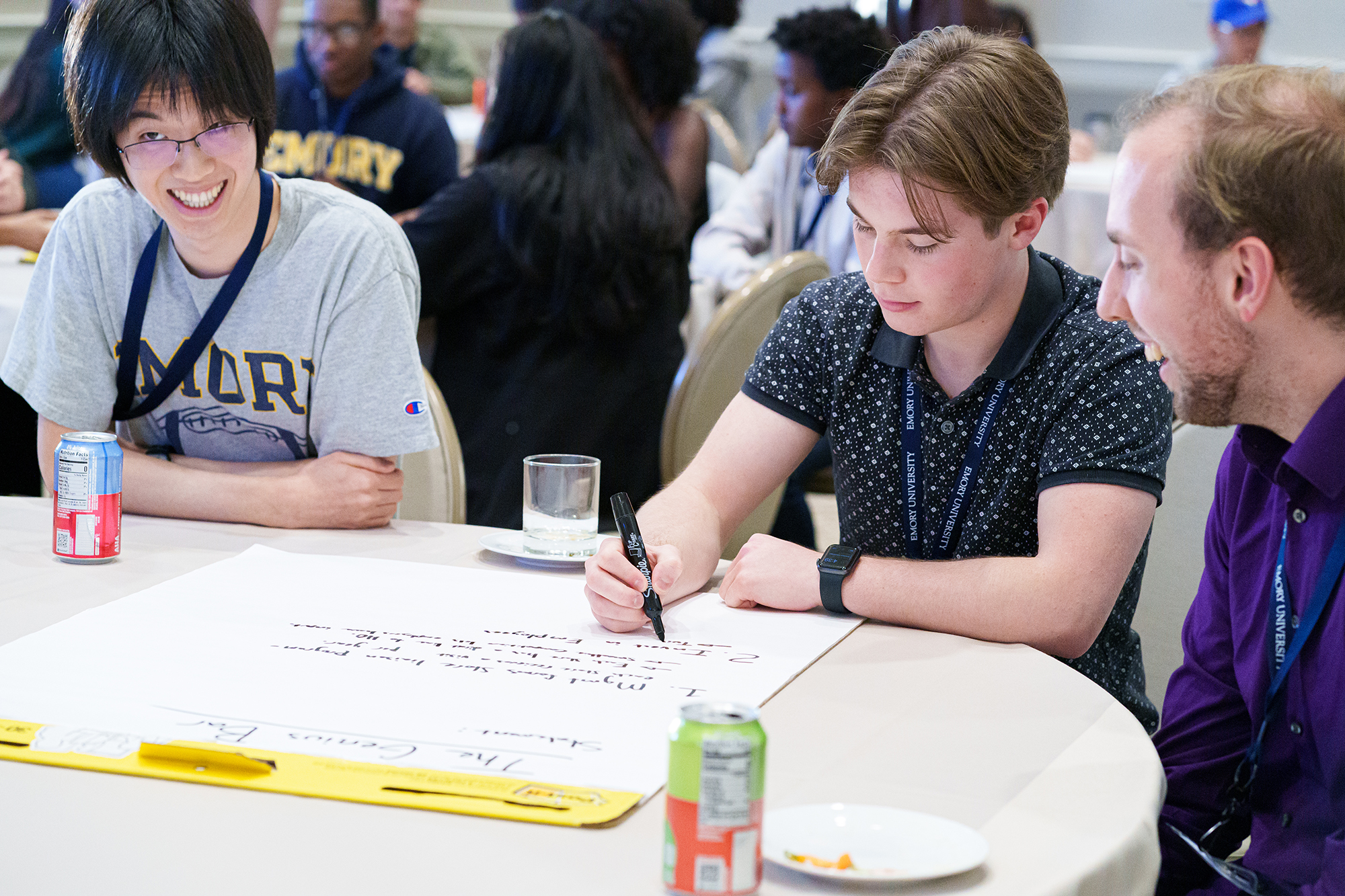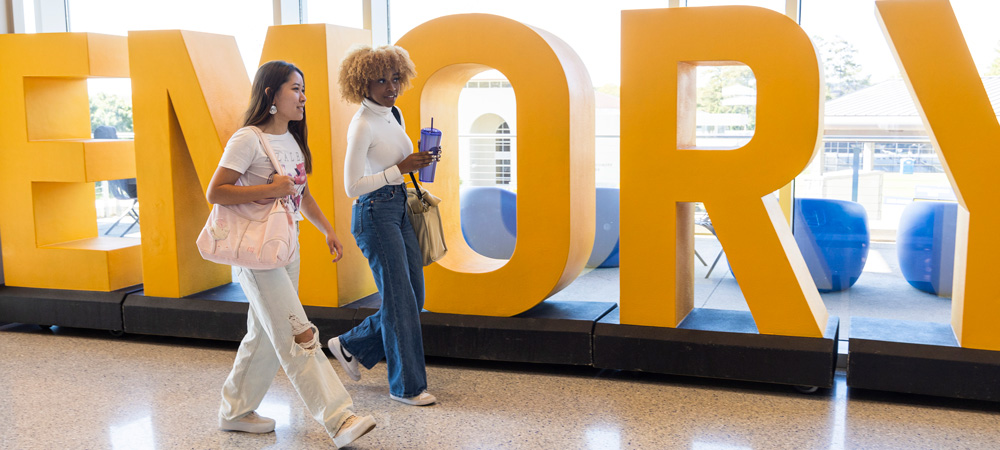Emory's merit-based scholarships empower students. Beyond prestige and financial aid, Emory University’s Scholar Programs provide…
Strong Personal Statements, Part 5: Find Commonality Between Opposing Topics

We’re sharing exceptional personal statements from last year’s applicants to illustrate that a good personal statement can be on a variety of topics, but ultimately, showcases the student’s character, curiosity, and voice. These statements, written by students now enrolled at Emory University, were selected for a multitude of reasons, and we asked our admission staff to share what made each statement stand out.
This is one of a 5-part series on application writing; read Part 1 here, Part 2 here, Part 3 here, and Part 4 here,
Some students have a background, identity, interest, or talent that is so meaningful they believe their application would be incomplete without it. If this sounds like you, then please share your story.
My fingers experienced a pulsating sensation like no other; with each heartbeat, the blood vessels in my arms contorted, screaming for help and accentuating the soreness of my muscles. However, I did not stop; I could not stop. The song was almost finished, with the last bars ringing throughout the room and filling the garage with harmonious, yet coarse sounds. Suddenly, the succession of blast beats occurs and my picking hand is free from its stiffened cage hovering above the bass strings. And then it stops. Taking a seat on my amp to rest, the melody still rang in my head. My breathing almost assimilating to the tempo of the song, we were united as one.
One Friday night, I decided to place my faith in Christ and devote my life as a Christian. Quickly thereafter, I joined the church praise team, yet found myself feeling ashamed of sharing my musical tastes with my peers. The song mentioned earlier is by the band, Tool. The song reigns in the obscure, intrinsic genre called progressive metal. It blends elements of the metal genre with distorted guitars, course riffs, and dense beats while retaining avant- garde qualities in order to further the boundaries of sound itself. These two artistries coalesce to form progressive metal; containing artistic compositions with irregular time signatures, loud aggression, cerebral, psychedelic noises and metaphysical lyrics. These qualities are what my band, Hunter, tries to create.
With the stigmatized view of metal as the “devil’s” music, I worried what my Christians friends would think about my affinity for metal music. Our praise team plays songs that are easy on the ears, which is completely opposite from progressive metal. I always wondered what it would be like to lead praise through metal music. But then again, I am fairly certain that they will look at me completely different. Though my metal band’s purpose is to dictate a spiritual story through the means of sounds and rhythms, it is not appreciated by most. The process of metal music is synonymous with a journey. It reflects and accentuates the various parts of my life as a student, musician, son, worker, leader, and now a Christian. It coalesces these distinct fragments to exemplify who I am through a musical outlet. The music we create is soft yet gritty, psychedelic yet concrete, ephemeral yet extended. Similarly, these contradictions represent a microcosm of who I am in and through the complexities of a person; complexities that crash together like the coarse riffs of the guitar and the rounded tone of the bass, producing an everlasting, beautiful balance.
Music to me has always been a method of escapism, to free myself, even only briefly from my daily stresses and anxieties. It was at this instance where I realized that metal and Christianity both contain a method of release may it be emotional or spiritual. Moreover, these two seemingly unrelated topics both maintain the same core message: to deliver the raw truth with no sugar-coated matters, and to accept yet renounce the difficulties of life.
Metal and Christianity both offer hope despite the failures and hardships we have experienced. And in both the genre of metal and the realm of Christianity, I am understood and accepted. Little by little, I am learning to share who I am with my new Christian family by introducing metal music through adding elements of it during praise time at church. Doing so has given surprising responses, but in a good way. In this, I see gradual acceptance of metal. And in that regard, I pick up my bass; whether it be to further my 10-minute composition to an 11-minute composition or to lay my life down for God for yet another day. I realize that the pulsating sensation in my fingers is my heart beating and crying out in joy for the metaphysical, blessed experience I am able to attain each week.
I plan to major in harp. I have 6 years of playing experience, and am also part of the National Harp Society. I am also currently still taking lessons by an instructor and playing at various recitals.
Feedback from Admission Staff
As we read applications, each student has a team of admission staff assigned to their file to review it and assess the student’s potential. The staff responsible for this student’s file had this to say about the personal statement:
This is one of the most interesting topics I think I’ve seen. A rock and roll Christian who sees a connection between his faith and metal music. I thought to myself: “this ought to be good.” And it is! This student is clearly so passionate about music that you can see it in each word choice. He doesn’t play music; his heart beats it. He doesn’t just finish a song; it rings throughout the room. This student has such a palpable passion for progressive metal music that the language in this essay mimics his music tastes. We have complicated syntax, interesting juxtapositions, and a little bit of overall confusion. Word of caution, this is not a style to imitate lightly. This essay is a big risk and it paid off.
This student had a great vocabulary and a pretty unique angle. But, at the heart of this essay, is a young student trying to find themselves. The personal statement prompts can daunt high school students because often they are unsure of their personal state. Writing over 500 words about your identity when you are young and still forming that identity seems unfair, we know. Sometimes taking a chance and showing the two most opposing parts of yourself can shed light into what might be ahead.
Don’t hesitate to connect with us by posting a comment to this blog, tweeting us @emoryadmission, or emailing us at admission@emory.edu. We look forward to hearing from you!



I have to agree with the admission staff that this student did a great job of showing the connection between his faith and metal music, but I’m wondering what advice you may have in terms of writing about faith in the personal statement. I have read that it is generally “safer” to avoid religion, as it may seem controversial–what is your take on that recommendation?
Thanks for your comment. In terms of what is safe or not safe to write about, that really is up to each student. In essays and short answers responses we look for the student’s voice and experience. And that can include religion for some students. It’s certainly not off limits. We encourage students to consider their own life’s experiences. To write about what feels true to them. And to consider what topic best showcases who they are as an individual. We’ve seen great essays about everyday things like bananas, family vacations, or a soccer ball. And we’ve seen great essays on heavier or more “controversial” topics, too. Oftentimes it’s not the topic, per se, that makes the essay but rather how the student approaches the topic.